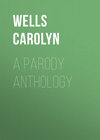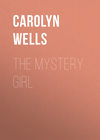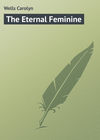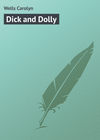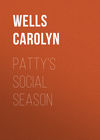Читать книгу: «A Parody Anthology», страница 9
Шрифт:
A STACCATO TO O LE LUPE
O LE LUPE, Gelett Burgess, this is very sad to find;
In the Bookman for September, in a manner most unkind,
There appears a half-page picture, makes me think
I've lost my mind.
They have reproduced a window, – Doxey's window (I dare say
In your rambles you have seen it, passed it twenty times a day), —
As "A Novel Exhibition of Examples of Decay."
There is Nordau we all sneer at, and Verlaine we all adore,
And a little book of verses with its betters by the score,
With three faces on the cover I believe I've seen before.
Well, here's matter for reflection, makes me wonder where I am.
Here is Ibsen the gray lion, linked to Beardsley the black lamb.
I was never out of Boston; all that I can say is, "Damn!"
Who could think, in two short summers we should cause so much remark,
With no purpose but our pastime, and to make the public hark,
When I soloed on THE CHAP-BOOK, and you answered with THE LARK!
Do young people take much pleasure when they read that sort of thing?
"Well, they buy it," answered Doxey, "and I take what it will bring.
Publishers may dread extinction – not with such fads on the string.
"There is always sale for something, and demand for what is new.
These young people who are restless, and have nothing else to do,
Like to think there is 'a movement,' just to keep themselves in view.
"There is nothing in Decadence but the magic of a name.
People talk and papers drivel, scent a vice, and hint a shame;
And all that is good for business, helps to boom my little game."
But when I sit down to reason, think to stand upon my nerve,
Meditate on portly leisure with a balance in reserve,
In he comes with his "Decadence!" like a fly in my preserve.
I can see myself, O Burgess, half a century from now,
Laid to rest among the ghostly, like a broken toy somehow;
All my lovely songs and ballads vanished with your "Purple Cow."
But I will return some morning, though I know it will be hard,
To Cornhill among the bookstalls, and surprise some minor bard;
Turning over their old rubbish for the treasures we discard.
I shall warn him like a critic, creeping when his back is turned:
"Ink and paper, dead and done with; Doxey spent what Doxey earned;
Poems doubtless are immortal where a poem can be discerned!"
How his face will go to ashes, when he feels his empty purse!
How he'll wish his vogue were greater, – plume himself it is no worse;
Then go bother the dear public with his puny little verse!
Don't I know how he will pose it, patronize our larger time:
"Poor old Browning; little Kipling; what attempts they made to rhyme!"
Just let me have half an hour with that nincompoop sublime!
I will haunt him like a purpose, I will ghost him like a fear;
When he least expects my presence, I'll be mumbling in his ear:
"O Le Lupe lived in Frisco, and I lived in Boston here.
"Never heard of us? Good heavens, can you never have been told
Of the Larks we used to publish, and the Chap-Books that we sold?
Where are all our first editions?" I feel damp and full of mould.
Bliss Carman.
BY THE SEA
Mutatis Mutandis
IS it life or is it death?
A whiff of the cool salt scum,
As the whole sea puffed its breath
Against you, – blind and dumb:
This way it answereth.
Nearer the sands it shows
Spotted and leprous tints;
But stay! yon fisher knows
Rock-tokens, which evince
How high the tide arose.
How high? In you and me
'Twas falling then, I think;
Open your heart's eyes, see
From just so slight a chink
The chasm that now must be.
You sighed and shivered then.
Blue ecstasies of June
Around you, shouts of fishermen,
Sharp wings of sea gulls, soon
To dip – the clock struck ten!
Was it the cup too full,
To carry it you grew
Too faint, the wine's hue dull
(Dulness, misjudged untrue!),
Love's flower unfit to cull?
You should have held me fast
One moment, stopped my pace.
Crushed down the feeble, vast
Suggestions of embrace,
And so be crowned at last.
But now! Bare-legged and brown
Bait-diggers delve the sand,
Tramp i' the sunshine down
Burnt-ochre vestured land,
And yonder stares the town.
A heron screams! I shut
This book of scurf and scum,
Its final pages uncut;
The sea-beast, blind and dumb,
Done with his bellowing? All but!
Bayard Taylor.
ANGELO ORDERS HIS DINNER
I, ANGELO, obese, black-garmented,
Respectable, much in demand, well fed
With mine own larder's dainties, where, indeed,
Such cakes of myrrh or fine alyssum seed,
Thin as a mallow-leaf, embrowned o' the top.
Which, cracking, lets the ropy, trickling drop
Of sweetness touch your tongue, or potted nests
Which my recondite recipe invests
With cold conglomerate tidbits – ah, the bill!
(You say), but given it were mine to fill
My chests, the case so put were yours, we'll say
(This counter, here, your post, as mine to-day),
And you've an eye to luxuries, what harm
In smoothing down your palate with the charm
Yourself concocted? There we issue take;
And see! as thus across the rim I break
This puffy paunch of glazed embroidered cake,
So breaks, through use, the lust of watering chaps
And craveth plainness: do I so? Perhaps;
But that's my secret. Find me such a man
As Lippo yonder, built upon the plan
Of heavy storage, double-navelled, fat
From his own giblet's oils, an Ararat
Uplift o'er water, sucking rosy draughts
From Noah's vineyard, – crisp, enticing wafts
Yon kitchen now emits, which to your sense
Somewhat abate the fear of old events,
Qualms to the stomach, – I, you see, am slow
Unnecessary duties to forego, —
You understand? A venison haunch, haut gout.
Ducks that in Cimbrian olives mildly stew.
And sprigs of anise, might one's teeth provoke
To taste, and so we wear the complex yoke
Just as it suits, – my liking, I confess,
More to receive, and to partake no less,
Still more obese, while through thick adipose
Sensation shoots, from testing tongue to toes
Far off, dim-conscious, at the body's verge,
Where the froth-whispers of its waves emerge
On the untasting sand. Stay, now! a seat
Is bare: I, Angelo, will sit and eat.
Bayard Taylor.
THE FLIGHT OF THE BUCKET
PRE-ADMONISHETH the writer:
H'm, for a subject it is well enough!
Who wrote "Sordello" finds no subject tough.
Well, Jack and Jill – God knows the life they led
(The poet never told us, more's the pity)
Pent up in some damp kennel of their own,
Beneath the hillside; but it once befell
That Jack and Jill, niece, cousin, uncle, aunt
(Some one of all the brood), would wash and scour,
Rinse out a cess-pit, swab the kennel floor,
And water (liquor vitae, Lawson calls,
But I – I hold by whisky. Never mind;
I didn't mean to hurt your feelings, sir,
And missed the scrap o' blue at buttonhole),
Spring water was the needful at the time,
So they must climb the hill for 't. Well and good.
We all climb hills, I take it, on some quest,
Maybe for less than stinking (I forgot!
I mean than wholesome) water… Ferret out
The rotten bucket from the lumber shed,
Weave ropes and splice the handle – off they go
To where the cold spring bubbles up i' the cleft,
And sink the bucket brimful in the spate.
Then downwards – hanging back? (You bet your life
The girl's share fell upon Jack's shoulders.) Down,
Down to the bottom – all but – trip, slip, squelch!
And guggle-guggle goes the bucketful
Back to the earth, and Jack's a broken head,
And swears amid the heather does our Jack.
(A man would swear who watched both blood and bucket,
One dripping down his forehead, t' other fled
Clinkety-tinkle, to the stones below,
A good half-hour's trudge to get it back.)
Jack, therefore, as I said, exploded straight
In brimstone-flavored language. You, of course,
Maintain he bore it calmly – not a bit.
A good bucolic curse that rent the cliffs
And frightened for a moment quaking Jill
Out of the limp, unmeaning girl's tee-hee
That womankind delight in… Here we end
The first verse – there's a deal to study in 't.
So much for Jack – but here's a fate above,
A cosmic force that blunders into right,
Just when the strained sense hints at revolution
Because the world's great fly-wheel runs aslant —
And up go Jill's red kibes. (You think I'm wrong;
And Fate was napping at the time; perhaps
You're right.) We'll call it Devil's agency
That sent the shrieking sister on her head,
And knocked the tangled locks against the stones.
Well, down went Jill, but wasn't hurt. Oh, no!
The Devil pads the world to suit his own,
And packs the cards according. Down went Jill
Unhurt. And Jack trots off to bed, poor brute,
Fist welted into eyeball, mouth agape
For yelling, – your bucolic always yells,
And out of his domestic pharmacy
Rips forth the cruet-stand, upsets the cat,
And ravages the store-room for his balm.
Eureka! – but he didn't use that word —
A pound of candles, corpse-like, side by side,
Wrapped up in his medicament. Out, knife!
Cut string, and strip the shrouding from the lot!
Steep swift and jam it on the gaping cut;
Then bedward – cursing man and friends alike.
Now back to Jill. She wasn't hurt, I said,
And all the woman's spite was up in arms.
So Jack's abed. She slips, peeks through the door,
And sees the split head like a luggage-label,
Halved, quartered, on the pillow. "Ee-ki-ree,
Tee-hee-hee-hee," she giggles through the crack,
Much as the Roman ladies grinned – don't smile —
To see the dabbled bodies in the sand,
Appealing to their benches for a sign.
Down thumbs, and giggle louder – so did Jill.
But mark now! Comes the mother round the door,
Red-hot from climbing up the hill herself,
And caught the graceless giggler. Whack! flack! whack!
Here's Nemesis whichever way you like!
She didn't stop to argue. Given a head
Broken, a woman chuckling at the door,
And here's your circumstantial evidence complete.
Whack! while Jack sniffs and sniggers from the bed.
I like that horny-handed mother o' Jill.
The world's best women died, sir, long ago.
Well, Jack's avenged; as for the other, gr-r-r-r!
Rudyard Kipling.
THE JAM-POT
THE Jam-pot – tender thought!
I grabbed it – so did you.
"What wonder while we fought
Together that it flew
In shivers?" you retort.
You should have loosed your hold
One moment – checked your fist.
But, as it was, too bold
You grappled and you missed.
More plainly – you were sold.
"Well, neither of us shared
The dainty." That your plea?
"Well, neither of us cared,"
I answer… "Let me see.
How have your trousers fared?"
Rudyard Kipling.
IMITATION OF ROBERT BROWNING
BIRTHDAYS? yes, in a general way;
For the most if not for the best of men.
You were born (I suppose) on a certain day,
So was I; or perhaps in the night, what then?
Only this: or at least, if more
You must know, not think it, and learn, not speak;
There is truth to be found on the unknown shore,
And many will find where few will seek.
For many are called and few are chosen,
And the few grow many as ages lapse.
But when will the many grow few; what dozen
Is fused into one by Time's hammer-taps?
A bare brown stone in a babbling brook, —
It was wanton to hurl it there, you say, —
And the moss, which clung in the sheltered nook
(Yet the stream runs cooler) is washed away.
That begs the question; many a prater
Thinks such a suggestion a sound "stop thief!"
Which, may I ask, do you think the greater,
Sergeant-at-arms or a Robber Chief?
And if it were not so? Still you doubt?
Ah! yours is a birthday indeed, if so.
That were something to write a poem about,
If one thought a little. I only know.
P. S
There's a Me Society down at Cambridge,
Where my works, cum notis variorum,
Are talked about; well, I require the same bridge
That Euclid took toll at as Asinorum.
And, as they have got through several ditties
I thought were as stiff as a brick-built wall,
I've composed the above, and a stiff one it is,
A bridge to stop asses at, once for all.
J. K. Stephen.
THE LAST RIDE TOGETHER
(From her Point of View)
WHEN I had firmly answered "No,"
And he allowed that that was so,
I really thought I should be free
For good and all from Mr. B.,
And that he would soberly acquiesce.
I said that it would be discreet
That for awhile we should not meet;
I promised that I would always feel
A kindly interest in his weal;
I thanked him for his amorous zeal;
In short, I said all I could but "yes."
I said what I'm accustomed to;
I acted as I always do.
I promised he should find in me
A friend, – a sister, if that might be;
But he was still dissatisfied.
He certainly was most polite;
He said exactly what was right,
He acted very properly,
Except indeed for this, that he
insisted on inviting me
To come with him for "one more last ride."
A little while in doubt I stood:
A ride, no doubt, would do me good;
I had a habit and a hat
Extremely well worth looking at;
The weather was distinctly fine.
My horse, too, wanted exercise,
And time, when one is riding, flies;
Besides, it really seemed, you see,
The only way of ridding me
Of pertinacious Mr. B.;
So my head I graciously incline.
I won't say much of what happened next;
I own I was extremely vexed.
Indeed I should have been aghast
If any one had seen what passed;
But nobody need ever know
That, as I leaned forward to stir the fire,
He advanced before I could well retire;
And I suddenly felt, to my great alarm,
The grasp of a warm, unlicensed arm,
An embrace in which I found no charm;
I was awfully glad when he let me go.
Then we began to ride; my steed
Was rather fresh, too fresh indeed,
And at first I thought of little, save
The way to escape an early grave,
As the dust rose up on either side.
My stern companion jogged along
On a brown old cob both broad and strong.
He looked as he does when he's writing verse,
Or endeavoring not to swear and curse,
Or wondering where he has left his purse;
Indeed it was a sombre ride.
I spoke of the weather to Mr. B.,
But he neither listened nor spoke to me.
I praised his horse, and I smiled the smile
Which was wont to move him once in a while.
I said I was wearing his favorite flowers,
But I wasted my words on the desert air,
For he rode with a fixed and gloomy stare.
I wonder what he was thinking about.
As I don't read verse, I shan't find out.
It was something subtle and deep, no doubt,
A theme to detain a man for hours.
Ah! there was the corner where Mr. S.
So nearly induced me to whisper "yes;"
And here it was that the next but one
Proposed on horseback, or would have done,
Had his horse not most opportunely shied;
Which perhaps was due to the unseen flick
He received from my whip; 't was a scurvy trick,
But I never could do with that young man, —
I hope his present young woman can.
Well, I must say, never, since time began,
Did I go for a duller or longer ride.
He never smiles and he never speaks;
He might go on like this for weeks;
He rolls a slightly frenzied eye
Towards the blue and burning sky,
And the cob bounds on with tireless stride.
If we aren't home for lunch at two
I don't know what papa will do;
But I know full well he will say to me,
"I never approved of Mr. B.;
It's the very devil that you and he
Ride, ride together, forever ride."
J. K. Stephen.
UP THE SPOUT
I
HI! Just you drop that! Stop, I say!
Shirk work, think slink off, twist friend's wrist?
Where that spined sand's lined band's the bay —
Lined blind with true sea's blue, as due —
Promising – not to pay?
II
For the sea's debt leaves wet the sand;
Burst worst fate's weight's in one burst gun?
A man's own yacht, blown – What? off land?
Tack back, or veer round here, then – queer!
Reef points, though – understand?
III
I'm blest if I do. Sigh? be blowed!
Love's doves make break life's ropes, eh? Tropes!
Faith's brig, baulked, sides caulked, rides at road;
Hope's gropes befogged, storm-dogged and bogged —
Clogged, water-logged, her load!
IV
Stowed, by Jove, right and tight, away.
No show now how best plough sea's brow,
Wrinkling – breeze quick, tease thick, ere day,
Clear sheer wave's sheen of green, I mean,
With twinkling wrinkles – eh?
V
Sea sprinkles wrinkles, tinkles light
Shells' bells – boy's joys that hap to snap!
It's just sea's fun, breeze done, to spite
God's rods that scourge her surge, I'd urge —
Not proper, is it – quite?
VI
See, fore and aft, life's craft undone!
Crank plank, split spritsail – mark, sea's lark!
That gray cold sea's old sprees, begun
When men lay dark i' the ark, no spark,
All water – just God's fun!
VII
Not bright, at best, his jest to these
Seemed – screamed, shrieked, wreaked on kin for sin!
When for mirth's yell earth's knell seemed please
Some dumb new grim great whim in him
Made Jews take chalk for cheese.
VIII
Could God's rods bruise God's Jews? Their jowls
Bobbed, sobbed, gaped, aped, the plaice in face!
None heard, 'tis odds, his – God's – folk's howls.
Now, how must I apply, to try
This hookiest-beaked of owls?
IX
Well, I suppose God knows – I don't.
Time's crimes mark dark men's types, in stripes
Broad as fen's lands men's hands were wont
Leave grieve unploughed, though proud and loud
With birds' words – No! he won't!
X
One never should think good impossible.
Eh? say I'd hide this Jew's oil's cruse —
His shop might hold bright gold, engrossible
By spy – spring's air takes there no care
To wave the heath-flower's glossy bell!
XI
But gold bells chime in time there, coined —
Gold! Old Sphinx winks there – 'Read my screed!'
Doctrine Jews learn, use, burn for, joined
(Through new craft's stealth) with health and wealth —
At once all three purloined!
XII
I rose with dawn, to pawn, no doubt,
(Miss this chance, glance untried aside?)
John's shirt, my – no! Ay, so – the lout!
Let yet the door gape, store on floor
And not a soul about?
XIII
Such men lay traps, perhaps – and I'm
Weak – meek – mild – child of woe, you know!
But theft, I doubt, my lout calls crime.
Shrink? Think! Love's dawn in pawn – you spawn
Of Jewry! Just in time!
Algernon Charles Swinburne.
AFTER WHITMAN
AN AMERICAN, ONE OF THE ROUGHS, A KOSMOS
NATURE, continuous Me!
Saltness, and vigorous, never torpi-yeast of Me!
Florid, unceasing, forever expansive;
Not Schooled, not dizened, not washed and powdered;
Strait-laced not at all; far otherwise than polite;
Not modest, nor immodest;
Divinely tanned and freckled; gloriously unkempt;
Ultimate yet unceasing; capricious though determined;
Speak as thou listeth, and tell the askers that which they seek to know.
Thy speech to them will be not quite intelligible.
Never mind! utter thy wild commonplaces;
Yawp them loudly, shrilly;
Silence with shrill noise the lisps of the foo-foos.
Answer in precise terms of barbaric vagueness
The question that the Fun editor hath sparked through Atlantic cable
To W..T W..TM.N, the speaker of the pass-word primeval;
The signaller of the signal of democracy;
The seer and hearer of things in general;
The poet translucent; fleshy, disorderly, sensually inclined;
Each tag and part of whom is a miracle.
(Thirteen pages of MS. relating to Mr. W..t W..tm.n are here omitted.)
Rhapsodically state the fact that is and is not;
That is not, being past; that is, being eternal;
If indeed it ever was, which is exactly the point in question.
Anonymous.
CAMERADOS
EVERYWHERE, everywhere, following me;
Taking me by the buttonhole, pulling off my boots, hustling me with the elbows;
Sitting down with me to clams and the chowder-kettle;
Plunging naked at my side into the sleek, irascible surges;
Soothing me with the strain that I neither permit nor prohibit;
Flocking this way and that, reverent, eager, orotund, irrepressible;
Denser than sycamore leaves when the north-winds are scouring Paumanok;
What can I do to restrain them? Nothing, verily nothing.
Everywhere, everywhere, crying aloud for me;
Crying, I hear; and I satisfy them out of my nature;
And he that comes at the end of the feast shall find something over.
Whatever they want I give; though it be something else, they shall have it.
Drunkard, leper, Tammanyite, small-pox and cholera patient, shoddy and codfish millionnaire,
And the beautiful young men, and the beautiful young women, all the same,
Crowding, hundreds of thousands, cosmical multitudes,
Buss me and hang on my hips and lean up to my shoulders,
Everywhere listening to my yawp and glad whenever they hear it;
Everywhere saying, say it, Walt, we believe it:
Everywhere, everywhere.
Bayard Taylor.
IMITATION OF WALT WHITMAN
WHO am I?
I have been reading Walt Whitman, and know not whether he be me, or me he; —
Or otherwise!
Oh, blue skies! oh, rugged mountains! oh, mighty, rolling Niagara!
Oh, chaos and everlasting bosh!
I am a poet; I swear it! If you do not believe it you are a dolt, a fool, an idiot!
Milton, Shakespere, Dante, Tommy Moore, Pope, never, but Byron, too, perhaps, and last, not least, Me, and the Poet Close.
We send our resonance echoing down the adamantine cañons of the future!
We live forever! The worms who criticise us (asses!) laugh, scoff, jeer, and babble babble – die!
Serve them right.
What is the difference between Judy, the pride of Fleet Street, the glory of Shoe Lane, and Walt Whitman?
Start not! 'Tis no end of a minstrel show who perpends this query;
'Tis no brain-racking puzzle from an inner page of the Family Herald,
No charade, acrostic (double or single), conundrum, riddle, rebus, anagram, or other guess-work.
I answer thus: We both write truths – great, stern, solemn, unquenchable truths – couched in more or less ridiculous language.
I, as a rule use rhyme, he does not; therefore, I am his Superior (which is also a lake in his great and glorious country).
I scorn, with the unutterable scorn of the despiser of pettiness, to take a mean advantage of him.
He writes, he sells, he is read (more or less); why then should I rack my brains and my rhyming dictionary? I will see the public hanged first!
I sing of America, of the United States, of the stars and stripes of Oshkosh, of Kalamazoo, and of Salt Lake City.
I sing of the railroad cars, of the hotels, of the breakfasts, the lunches, the dinners, and the suppers;
Of the soup, the fish, the entrées, the joints, the game, the puddings and the ice-cream.
I sing all – I eat all – I sing in turn of Dr. Bluffem's Antibilious Pills.
No subject is too small, too insignificant, for Nature's poet.
I sing of the cocktail, a new song for every cocktail, hundreds of songs, hundreds of cocktails.
It is a great and a glorious land! The Mississippi, the Missouri, and a million other torrents roll their waters to the ocean.
It is a great and glorious land! The Alleghanies, the Catskills, the Rockies (see atlas for other mountain ranges too numerous to mention) pierce the clouds!
And the greatest and most glorious product of this great and glorious land is Walt Whitman;
This must be so, for he says it himself.
There is but one greater than he between the rising and the setting sun.
There is but one before whom he meekly bows his humbled head.
Erase your national advertisements of liver pads and cures for rheumatism from your public monuments, and inscribe thereon in letters of gold the name Judy.
Judy.
Жанры и теги
Возрастное ограничение:
12+Дата выхода на Литрес:
29 июня 2017Объем:
210 стр. 1 иллюстрацияПравообладатель:
Public Domain
